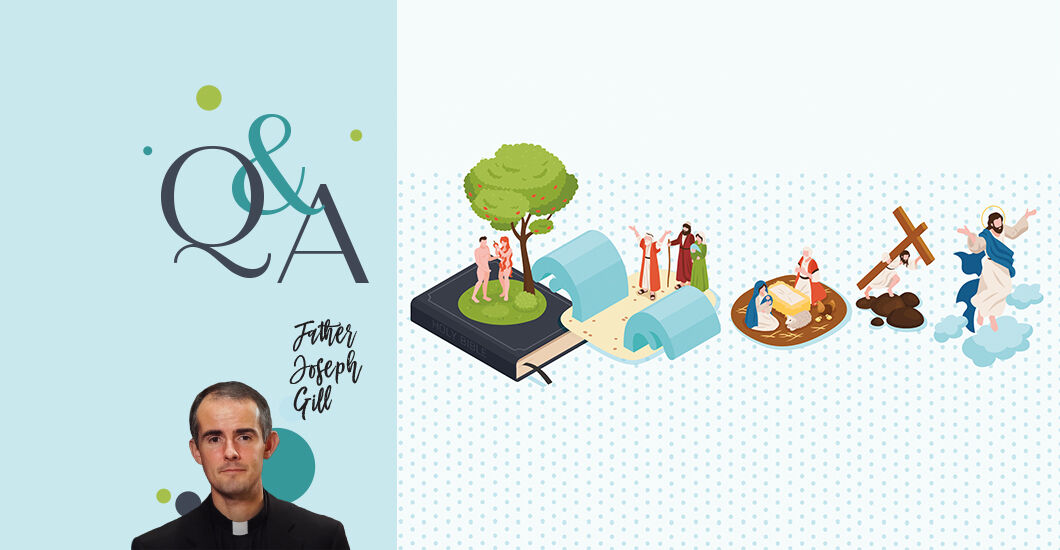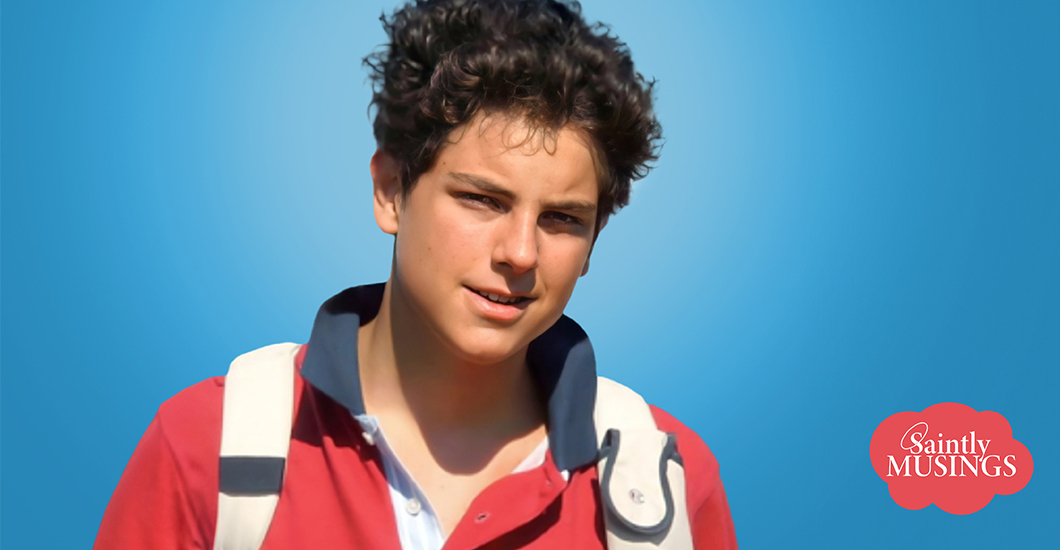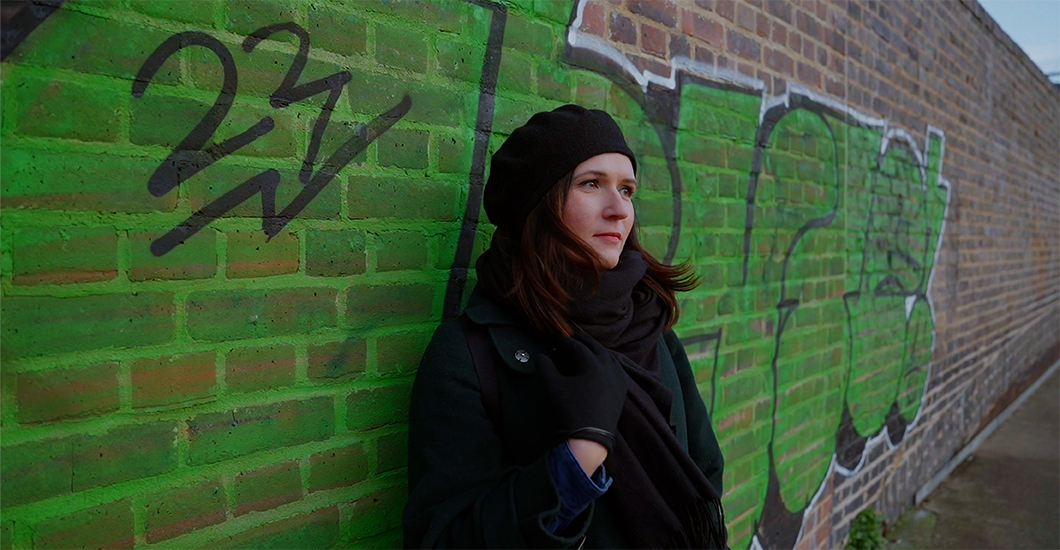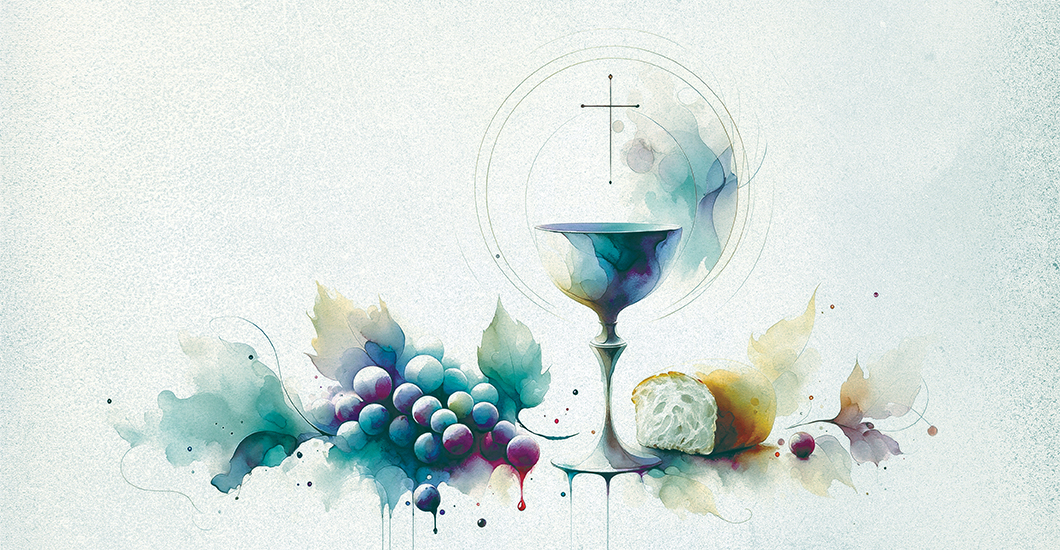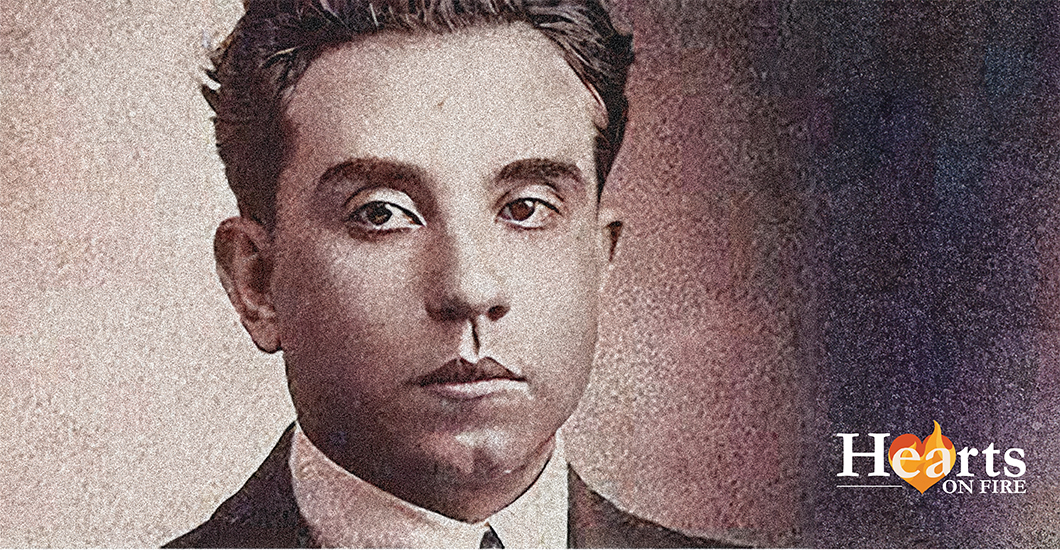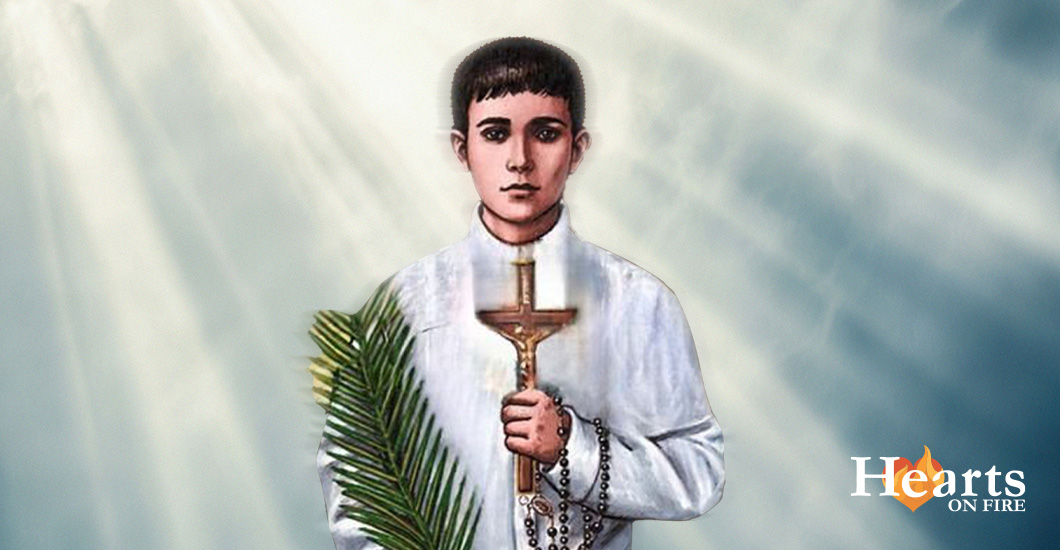Q&A: How Do I Read the Bible?
Question: I want to start reading the Bible, but I don’t know where to start. Do I read it straight through, like a novel? Should I just open to a random page and start reading? What do you recommend?
Answer: The Bible is such a powerful place to encounter Jesus! As Saint Jerome said, “Ignorance of Scripture is ignorance of Christ.” So, you are to be commended for wanting to make it part of your spiritual life!
At first glance, the Bible can seem unwieldy, full of disjointed stories, long genealogies, laws and prophesies, poetry and songs, etc. I recommend two ways of reading the Bible. First, don’t read the Bible from beginning to end, because some books are tough to plow through! Instead, use Dr. Jeff Cavins “The Great Adventure Bible Timeline” to read your way through the overarching story of Salvation History—the story of how God worked throughout human history, starting with Creation, to save us from our sins. God created the world good, but human beings fell through original sin and brought evil into the world. But God did not abandon us. Instead, he formed relationships with us, called covenants, through with Abraham, Moses, and David. He taught us how to follow Him through the Law, and called us back to faithfulness to His promises through the prophets. Finally, God sent his son, Jesus, as the definitive solution to the human brokenness, pain, and anguish caused by sin. Through His life, death, and Resurrection, Jesus reconciled us to God once and for all, and established His Church to bring that salvation to the ends of the earth.
The Bible tells this amazing story of Salvation History in various parts of various books. Dr. Cavins’ Timeline guides you through the books and chapters you should read to grasp the entire story, from Adam to Jesus.
Another great way to read the Bible is called lectio divina. This “sacred reading” approach invites you to take a small passage and let God speak to you through it. It may be best to start with a passage from the Gospels or from the letters of Saint Paul—maybe 10-20 verses. The process of Lectio Divina involves four steps:
Lectio (Reading): First, pray to the Holy Spirit. Then, read the passage through once slowly (out-loud, if you can). Focus on any word, phrase, or image that stands out to you.
Meditatio (Meditation): Read the passage a second time, and ask how God is communicating to you through the word, phrase or image that stood out. In what way does it apply to your life?
Oratio (Prayer): Read the passage a third time, and speak to God about the word, phrase, or image that struck you. What does it reveal about God? Is He asking you to change in response to His word? Make a resolution to be more faithful to Him.
Contemplatio (Contemplation): Sit quietly in God’s presence. Pay attention to any words, images, or memories that may surface in your thoughts—this is how God communicates in silence.
Use this method on a daily basis to work your way through a gospel or Pauline letter. You will find that God will give you insights and wisdom you never thought you could have. May God bless your efforts to know Him through His Word! Whether you are reading it to understand Salvation History and how God has worked in the past or praying with Scripture through Lectio Divina to know how God is working in the present, the Word of God is living and effective, and it can change your life!
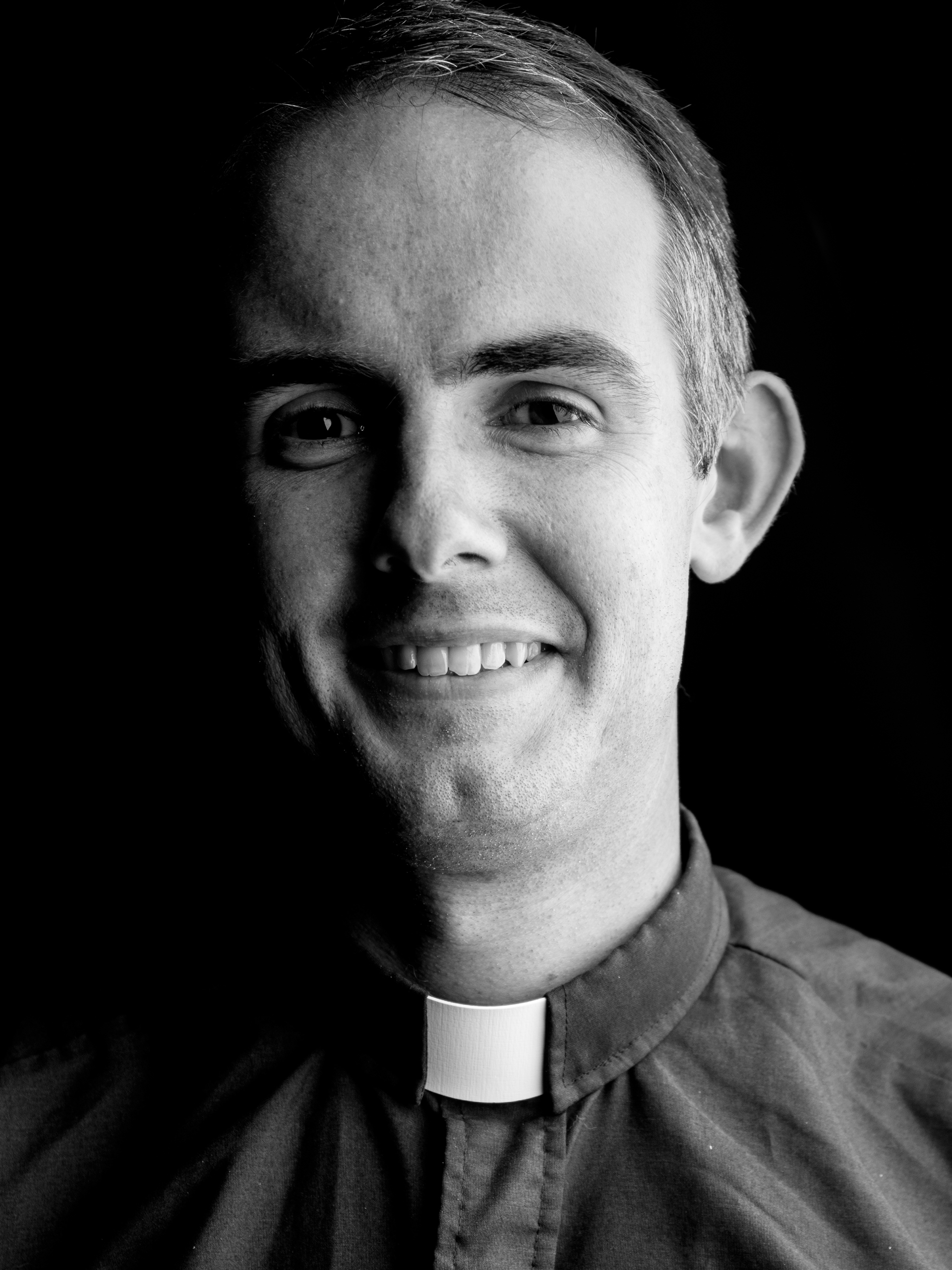
Father Joseph Gill is a high school chaplain and serves in parish ministry. He is a graduate from Franciscan University of Steubenville and Mount St. Mary’s Seminary. Father Gill has published several albums of Christian rock music (available on iTunes). His debut novel, “Days of Grace” is available on amazon.com.
Related Articles
When Andrea Acutis arranged a pilgrimage to Jerusalem, he thought that his son would be excited. Carlo was keen on going to daily Mass and reciting his prayers, so his reply came as a surprise: "I prefer to stay in Milan … Since Jesus remains with us always, in the Consecrated Host, what need is there to make a pilgrimage to Jerusalem to visit the places where He lived 2000 years ago? Instead, tabernacles ought to be visited with the same devotion!" Andrea was struck by this great devotion that his son cherished for the Eucharist. Carlo was born in 1991, the year the World Wide Web was invented. The little genius walked when he was just four months old, and started reading and writing at the age of three. The world would’ve looked at his intellect and dreamt of a bright future but the Divine had different plans. Combining his love for the Eucharist and technology, he left the world a great legacy of a record of Eucharistic miracles from across the world. He began the collection in 2002 when he was just 11 years old and completed it a year before he succumbed to leukemia. This young computer geek, at such a young age, even built a website (carloacutis.com), a lasting record, with all the collected information. The Eucharistic exhibition he pioneered was held in five continents. Ever since, many miracles have been reported. On his website, he has written the lasting mission of his life on Earth: "The more Eucharist we receive, the more we will become like Jesus, so that on this Earth, we will have a foretaste of Heaven." This Italian teenage designer and computer whiz is soon to become Saint Carlo Acutis. Widely known as the first millennial patron of the internet, Blessed Carlo continues to draw millions of youngsters to the love of Jesus in the Eucharist.
By: Shalom Tidings
MoreFrom being a healthy Uni-student to a paraplegic, I refused to be confined to a wheelchair… In the initial years of University, I slipped a disc. Doctors assured me that being young and active, physiotherapy, and exercises could make me better, but despite all effort, I was in pain every day. I had acute episodes every few months, which kept me in bed for weeks and led to repeated hospital visits. Nevertheless, I held on to hope, until I slipped a second disc. That's when I realized my life had changed. Angry at God! I was born in Poland. My mom teaches theology, so I was brought up in the Catholic faith. Even when I moved to Scotland for University and then to England, I held onto it dearly, maybe not in a do-or-die manner, but it was always there. The initial phase of moving to a new country wasn’t easy. My home had been a furnace, with my parents fighting among themselves most of the time, so I had practically run away to this alien land. Leaving my difficult childhood behind, I wanted to enjoy my youth. Now, this pain was making it difficult for me to hold down jobs and keep myself financially balanced. I was angry at God. Yet, He wasn’t willing to let me go. Trapped at home in acute pain, I resorted to the only available pastime—my mother’s collection of religious books. Slowly, the retreats I attended and the books I read led me to realize that despite my distrust, God really wanted my relationship with Him to be strengthened. But I was also not totally over the anger that He wasn’t healing me yet. Eventually, I came to believe God was angry at me and didn’t want to heal me so I thought maybe I could trick him. I started looking for a holy priest with good ‘statistics’ for healing so that I could get healed when God was busy doing other things. Needless to say, that never happened. A Twist in My Journey One similar day in a prayer group, I was in so much pain. Fearing an acute episode, I was planning to leave when one of the members there asked if there was something I would like them to pray for. I was having some trouble at work, so I said yes. As they were praying, one of the men asked if there was some physical illness that I needed praying over. They were way down on my ‘healing rating’ list, so I didn’t trust that I would receive any relief, but I said ‘Yes’ anyway. They prayed and my pain was gone. I returned home, and it was still gone. I started jumping and twisting and moving around, and I was still okay. But nobody believed me when I told them I was healed. So, I stopped telling people; instead, I went to Medjugorje to thank Our Lady. There, I had an encounter with a man who was doing Reiki and wanted to pray over me. I refused, but before leaving he gave me a goodbye hug which left me worried because I recalled his words that his touch has power. I allowed fear to take over and falsely believed this evil’s touch was stronger than God. I woke up the next morning in excruciating pain, unable to walk. After four months of relief, my pain returned so acutely that I thought I wouldn’t even be able to make it back to the UK. When I returned, I found that my discs were touching the nerves, causing even more drastic pain for months. After six or seven months, the doctors decided that they needed to do the risky procedure on my spine that they had been keeping off for a long time. The surgery damaged a nerve in my leg, and my left leg was paralyzed knee-down. A new journey began there and then, a different one. I Know You Can Do it The very first time I arrived home in a wheelchair, my parents were terrified, but I was filled with joy. I loved all the technological stuff…every single time someone pressed a button on my wheelchair, I was excited like a kid. It was over the Christmas period, when my paralysis started regressing that I realized the extent of damage to my nerves. I was admitted to a hospital in Poland for a while. I didn't know how I was going to live. I was just praying to God that I needed another healing: “I need to find you again because I know you can do it.” So, I found a healing service and was convinced that I would be healed. A Moment You Don’t Wanna Miss It was Saturday and my father had initially not wanted to go. I just told him: “You don't want to miss out when your daughter is healed.” The original schedule had a Mass, followed by the healing service with Adoration. But when we arrived, the priest said they had to change the plan as the team that was meant to lead the healing service was not there. I remember thinking I don’t need any team: “I only need Jesus.” When the Mass started, I did not hear a single word. We were sitting on the side where there was a Divine Mercy picture. I looked at Jesus like I had never seen Him before. It was a stunning image. He looked so beautiful! I never saw that picture anywhere after that. All through Mass, the Holy Spirit was enveloping my soul. I was simply saying in my head ‘Thank you’ even though I didn’t know what I was thankful for. I wasn’t able to ask for healing, and it was frustrating because I needed healing. When adoration started I asked my mom to take me to the front, as close to Jesus as possible. There, seated up front, I felt someone touching, and massaging my back. I was getting so warm and cozy that I felt like I would fall asleep. So, I decided to walk back to the bench, forgetting that I could not ‘walk.’ I just walked back and my mom ran after me with my crutches, praising God, saying: “You are walking, you are walking.” I was healed, by Jesus in the Blessed Sacrament. As soon as I sat down, I heard a voice saying: “Your faith has healed you.” In my mind, I saw the image of the woman touching the cloak of Jesus when He was passing. Her story reminds me of mine. Nothing was helping until I reached this point where I started trusting Jesus. The healing came when I accepted Him and told Him: “You are all I need.” My left leg had lost all its muscles and even that grew back overnight. It was very significant because the doctors were measuring it before, and they found an astounding, unexplainable change. Shouting it Out This time around when I received the healing, I wanted to share it with everyone. I wasn't embarrassed anymore. I wanted everyone to know how amazing God is and how much He loves all of us. I'm no one special and I haven't done anything special to receive this healing. Being healed also doesn't mean that my life became super-comfortable overnight. There are still difficulties, but they are much lighter. I take them to the Eucharistic Adoration and He gives me solutions, or ideas on how I can deal with them, as well as the assurance and trust that He will deal with them.
By: Ania Graglewska
MoreA gift that you can access from anywhere in the world, and guess what? It’s free not just for you but for everyone! Imagine that you are lost in a deep pit of darkness and hopelessly groping around. Suddenly, you see a great light and someone reaching out to rescue you. What a relief! The overwhelming peace and joy can’t be fully expressed in words. The Samaritan woman felt like this when she met Jesus at the well. He told her: “If you knew the gift of God, and who it is that is saying to you: ‘Give me a drink,’ you would have asked Him, and He would have given you living water.” (John 4:10) As soon as she heard these words, the woman realized that she had been waiting her whole life for this. “Give me this water, so that I may never be thirsty,” she implored: (John 4:15) It was only then, in response to her request and thirst for knowledge of the Messiah, that Jesus revealed Himself to her: “I am He, the One who is speaking to you.” (John 4:26) He is the living water that quenches every thirst—the thirst for acceptance, the thirst for understanding, the thirst for forgiveness, the thirst for justice, the thirst for happiness, and most importantly, the thirst for love, God’s love. Until You Ask… The gift of Christ’s presence and mercy is available for everyone. “God proves His love for us in that, while we were still sinners, Christ died for us.” (Romans 5:8) He died for every sinner so that by the Blood of Christ, we may be cleansed from our sin and be reconciled with God. But, like the Samaritan woman, we need to ask Jesus. As Catholics, we can easily do this through the Sacrament of Penance, confessing our sins and being reconciled with God when the priest absolves us from sin, using the power given by God to act in persona Christi (in the person to Christ). It gives me great peace to frequent this Sacrament because the more I do it, the more I become receptive to the Holy Spirit. I can feel Him speaking through my heart, helping me to discern good from evil, growing in virtue as I flee from vice. The more frequently I repent of my sins and turn back to God, the more sensitive I become to the presence of Jesus in the Holy Eucharist. I become conscious of His presence in those who have received Him in Holy Communion. I feel His warmth in my heart when the priest walks past me with the ciborium filled with the Consecrated Host. Let’s be honest about it. Many people line up for Communion, but very few people line up for Confession. It is sad that many people are missing out on such a very important source of grace to strengthen us spiritually. Here are a few things that help me get the most out of Confession. Be Prepared A thorough examination of the conscience is necessary before Confession. Prepare by going through the commandments, the seven deadly sins, the sins of omission, the sins against purity, charity, etc. For a sincere confession, the conviction of sin is a prerequisite, so it is always helpful to ask God to enlighten us about certain sins we committed that are unknown to us. Ask the Holy Spirit to remind you of sins you have forgotten, or make you aware of where you have been unconsciously going wrong. Sometimes we delude ourselves into thinking that something is okay when it’s not. Once we prepare well, we can again seek the assistance of the Holy Spirit to wholeheartedly admit our failures with a contrite heart. Even if we are not approaching confession with a perfectly contrite heart, it can happen during confession itself through the grace present in the Sacrament. Regardless of what you are feeling about certain sins, it’s good to confess them anyway; God forgives us in this Sacrament if we honestly admit our sins, recognizing that we have done wrong. Be Honest Be honest with yourself about your own weaknesses and failures. Admitting struggles, and dragging them out of the darkness into the light of Christ will relieve you of paralyzing guilt and bolster you against sins you tend to commit repeatedly (such as addictions). I remember once, in confession, when I told the priest about a certain sin that I just couldn’t seem to come out of, he prayed over me to specifically receive the grace from the Holy Spirit to help overcome it. The experience was so liberating. Be Humble Jesus told Saint Faustina that “A soul does not benefit as it should from the Sacrament of Penance if it is not humble. Pride keeps it in darkness.” (Diary, 113) It is humiliating to kneel in front of another human being and openly encounter the dark areas of your life. I remember receiving a very long sermon for confessing a grave sin once and getting reprimanded for repeatedly confessing the same sin. If I can learn to look at these experiences as the loving corrections of a Father who cares so much about your soul and willingly humble myself, those bitter experiences can become blessings. The forgiveness of God is a powerful indication of His love and faithfulness. When we step into His embrace and confess what we’ve done, it restores our relationship with Him as our Father and we, His children. It also restores our relationship with one another who belong to one body—the body of Christ. The best part of receiving God’s forgiveness is how it restores the purity of our soul so that when we look at ourselves and others, we get to see God dwelling in all.
By: Cecil Kim Esgana
MoreWhat happens to your soul when you have an unexpected encounter…? I have a fond childhood memory about Eucharistic Adoration which is very dear to my heart. I participated in the rite of exposition and benediction of the Blessed Sacrament as a child, and I was mesmerized by the Eucharistic Jesus in a majestic monstrance with incense rising up towards Him. As the priest worshipped God by swinging the censer, incense rose towards the Eucharist and the whole congregation sang together, “O Sacrament Most Holy, O Sacrament Divine, All praise and all thanksgiving, Be every moment Thine.” I longed to touch the censer myself and gently push it forward so I could cause the incense to rise up to the Lord Jesus. The priest gestured to me not to touch the censer and I turned my attention to the incense smoke that rose up along with my heart and eyes to the Lord God fully present in the Eucharist. This participation in Eucharistic Adoration as a child filled my soul with so much beauty—the smell of the incense, the entire congregation singing in unison, and the vision of the Eucharistic Lord being worshipped—my senses were thoroughly satisfied, leaving me longing for the experience again. Caught Again I admit with much sadness however that several years afterwards, as a teenager—when I had more opportunities—I gave into hesitation and stayed away from Eucharistic Adoration, depriving myself of such great beauty and source of sanctity. My reason for this seems to me very silly now. I thought I had to continuously pray for the entire one hour of Eucharistic Adoration and it seemed like a very long time. How many of us today hesitate to go to Eucharistic Adoration for similar reasons? We sometimes feel stressed, bored, lazy or even afraid about going to Eucharistic Adoration and we deprive ourselves of this great gift. I say, the trick is to just start going and soon you wouldn’t want to stop. Stronger than Ever Life threw its share of struggles and trials at me in my young adulthood; recalling where I had received such comfort, I turned to God for strength and sustenance. One specific way I turned to God is by going to Eucharistic Adoration on First Fridays. I began by sitting silently in the presence of Jesus in the Blessed Sacrament for a whole hour, first, simply allowing myself to be there; and then just talking to the Lord about my life, asking for His help and telling Him that I loved Him. Have you ever thought of the possibility of simply showing up in front of the Eucharistic Jesus and doing nothing but staying in His divine presence for an hour? For me, as years went by, I found that spending time at Eucharistic Adoration has changed my life in profound ways, as I become more and more aware of my deepest identity as a beloved daughter of God. We know that our Lord Jesus is truly and fully present in the Eucharist, His body, blood, soul and divinity. The Eucharist is Jesus Himself. Spending time with the Eucharistic Jesus can cleanse you from your sins and fill you with His great love for you. Let us always be fervent, to spend one hour with our God, who continues to be with us in the Eucharist, to the end of the age. Our personal relationship with our God will develop and become stronger and stronger, the more we spend time with the Lord Jesus in Eucharistic Adoration. I assure you that it will become easier, therefore, do not give in to the initial hesitation and do not be afraid in any way to spend time with our Eucharistic Lord, who is love and mercy itself, goodness and goodness alone.
By: Pavithra Kappen
MoreDid you know that we have all been invited to the Greatest Feast in the history of mankind? A few years ago, I was reading the story of the birth of Dionysus with my students. Persephone, the legend goes, was impregnated by Zeus and asked to see him in his true form. But a finite creature cannot look upon an eternal being and live. So, the mere sight of Zeus caused Persephone to explode, there and then, on the spot. One of my students asked me why we don’t explode when we receive the Eucharist. I told him I didn’t know, but it couldn’t hurt to be prepared. The Approach Every day, and in every Catholic church around the world, a great miracle is at work—the greatest miracle in the history of the world: the Creator of the universe is incarnate on the altar, and we are invited to approach that altar to take Him in our hands. If we dare. There are some who argue—and convincingly—that we shouldn’t dare to walk up and grab the Eucharist as though it were a theater ticket or a drive-through order. There are others who argue, and convincingly, that the human hand makes a worthy throne for such a humble King. Either way, we should be prepared. In 2018, I visited the Tower of London with my family. We stood in line for an hour and a half to see the Crown Jewels. An hour and a half! First, we were issued tickets. Then, we sat through a documentary video. Shortly after, we were ushered through a winding series of velvet, roped corridors past silver and gold vessels, suits of armor, lavish and costly outfits of fur, satin, velvet, and woven gold…until at last, we were granted a brief glimpse of the crown through bullet-proof glass and over the shoulders of heavily armed guards. All that just to see the Queen’s crown! There is something infinitely more precious at every Catholic Mass. We should be prepared. We should be trembling. Mobs of Christians should be fighting for a glimpse of this miracle. So, where is everybody? Quarantine Miracle During the pandemic, when the Church doors were closed to the faithful, and we were forbidden—well, you were forbidden—from witnessing this miracle in person, how many begged the Church to have the courage to trust that we’d rather die than be deprived of this miracle? (Don’t get me wrong. I don’t blame the Church’s decision which was based on the very best medical advice.) I don’t remember hearing about any outrage, but then, I was busy hiding in the cloister, sterilizing countertops, and doorknobs. What would you give to have been there at Cana when Jesus worked His first miracle—to stand in the presence of the Queen of Heaven? What would you give to have been there on that first Holy Thursday night? Or to have stood at the foot of the Cross? You can. You’ve been invited. Be aware and be prepared.
By: Father Augustine Wetta O.S.B
MoreWe are all looking for ‘immersive’ experiences, but what of the ultimate experience we have been freely given? During the Worldwide Developers Conference in California, Apple introduced its Vision Pro headset, a head-mounted device resembling oversized swimming goggles. Essentially, it functions as a comprehensive computer, smartphone, and home theatre, incorporating virtual reality, augmented reality, and mixed reality technologies. Many consider this product to be the future of smartphones. With the Vision Pro headset, users can control their visual experience, actions, and even thoughts using voice commands and hand and finger gestures in the air. My brain popped. Imagine the possibilities! But could the use of this headset raise concerns about increased social isolation and a decline in shared experiences? For instance, if it replaces the traditional cinema room with large televisions where families not only watch something together but also bond with each other, wouldn’t this technology endanger core human connections? But what if there is an immersive experience that does not destroy the experience of communion? Getting Connected Have you ever considered that when we receive the Blessed Sacrament, God is giving us the most amazing immersive experience ever? By creating us in His image and likeness, God gifted us with His desire for shared experience and union. In its fullness, this is a desire for union with God Himself. As the psalmist writes: “As a deer longs for flowing streams, so my soul longs for you, O God. My soul thirsts for God.” (Psalm 42: 1-2) However, our contemporary culture has perverted this longing into an obsession with sex, power, money, and belongings. Sin has corrupted our desire for holistic union. Jesus expresses His longing for communion with us when He tells the apostles: “I have eagerly desired to eat this Passover with you…” (Luke 22:15). He desired to be in communion with us so much, that He commanded us to eat and drink Him–to be so united with Him that our bodies are commingled. The Eucharist is not a one-man show. It is a shared experience of a community around the table sharing one cup and one bread. Participation is its core. Richard Hooker, a theologian writes that 'participation' refers to the reciprocal and intimate connection between Christ and believers where Christ holds us, and we hold Christ. In this bond, there is a sense of sharing one another through a unique relationship, shared interests, and a profound union. Christ is truly present in the bread and wine, and it is radical faith. If we believe Christ is present universally, why would it be hard to believe that he is truly present in the consecrated host and wine? This presence is designed for intimate communion by eating and drinking. As we leave the church, we carry His presence into the world. Then, as we pour out ourselves in service to others, we draw them into His presence.
By: Father Bony Abraham
MoreLoneliness is the new normal worldwide, but not for this family! Read on for this incredible tip on staying connected always. I recently became an empty nester. All five of my children live hours apart from one another, which makes family gatherings few and far between. This is one of the bittersweet consequences of successfully launching your children; they can fly pretty far sometimes. Last Christmas, our whole family had the happy occasion of visiting with each other. At the end of those three joyful days, when it was time for goodbyes, I overheard one sibling say to another: “I’ll see you in the Eucharist.” This is the way. This is how we stay close to one another. We cling to the Eucharist. And Jesus binds us together. We certainly miss one another and wish we had more time together. But God has called us to work in different pastures and to be content with the time we’ve been given. So, in between visits and phone calls, we go to Mass and continue to stay connected. Feeling Alone? Attending the Most Holy Sacrifice of the Mass allows us to enter into a reality that’s not bound by space and time. It’s the stepping out of this world and into a sacred space where Heaven touches Earth in a real way, and we are united with the entire family of God, those worshiping both here on Earth and in Heaven. By partaking in Holy Communion, we find that we indeed are not alone. One of Jesus’ last words to His disciples was: “I am with you always, to the end of the age.” (Matthew 28:20) The Eucharist is the immense gift of His continual Presence with us. Naturally, we miss loved ones who are no longer with us; sometimes, the ache can be quite fierce. It is in those moments that we must cling to the Eucharist. On particularly lonesome days, I make an extra effort to get to Mass a little early and linger a little longer afterward. I intercede for each of my loved ones and receive comfort knowing I am not alone and that I am close to Jesus’ Heart. I pray that each of my loved one’s hearts are also close to Jesus’ Heart, so we can also be together. Jesus promised: “And I, when I am lifted up from the earth, will draw all people to Myself.” (John 12:32) Incredibly Close One of my favorite lines during the Eucharistic Prayer is this: “Humbly we pray that partaking of the body and blood of Christ, we may be gathered into one by the Holy Spirit.” God gathers what once was scattered and draws us into the one body of Christ. The Holy Spirit at Mass has been tasked in a particular way with uniting us. We absolutely need God’s help to be in true communion with others. Have you ever been in the same room with someone, but yet it felt like you were a million miles away? The opposite of that can also be true. Even if we are miles apart, we can feel incredibly close to others. Ultimate Reality Last year, I felt particularly close to my grandmother at her funeral Mass. It was very comforting, for I felt like she was right there with us, especially during the Eucharistic prayer and Holy Communion. My grandmother had a strong devotion to the Eucharist and strove to attend daily Mass for as long as she physically could. I was so grateful for that time of intimacy with her and will always treasure that. This reminds me of another portion of the Eucharistic prayer: “Remember also our brothers and sisters who have fallen asleep in the hope of the resurrection and all who have died in Your mercy: welcome them into the light of Your face. Have mercy on us all, we pray, that with the Blessed Virgin Mary, Mother of God, with Blessed Joseph, Her Spouse, with the Blessed Apostles, and all the Saints who have pleased You throughout the ages, we may merit to be co-heirs to eternal life, and may praise and glorify You through Your Son, Jesus Christ.” While at Mass or Eucharistic Adoration, we are in the Real Presence of our Lord and Savior Jesus Christ. We are also joined by the Saints and Angels in Heaven. One day we will see this reality for ourselves. For now, we believe with the eyes of faith. Let us take courage whenever we feel lonely or are missing a loved one. Jesus’ Loving and Merciful Heart is constantly beating for us and yearning for us to spend time with Him in the Eucharist. This is where we find our peace. This is where our hearts are fed. Like Saint John, let us rest peacefully on the loving breast of Jesus and pray that many others will find their way to His Sacred Eucharistic Heart. Then, we will be truly together.
By: Denise Jasek
MoreI approached Him for success in my studies, but He didn’t stop there… During my high school years, I experienced a remarkable journey of faith and academic growth. As a devout Catholic, I firmly believed that God's presence was constantly with me, especially when it came to my studies. I remember one particular semester, I was facing a daunting load of exams and assignments. The subjects seemed to pile up, and I felt overwhelmed by the sheer amount of information I needed to grasp. Doubt started to creep into my mind, making me question my abilities. In those moments of uncertainty, I turned to prayer as my source of solace and guidance. Each evening, I would retreat to my room, light a candle, and kneel before my crucifix. I poured my heart out to God, expressing my fears and doubts while asking for strength, wisdom, and clarity in my studies. An Invisible Guide As the weeks went by, I noticed something extraordinary happening. Whenever I encountered a challenging topic or struggled with a difficult concept, I would find unexpected clarity. It was as if a light was being shone upon my path, illuminating the way forward. I would stumble upon helpful resources or passages in books that perfectly explain complex ideas, or receive unexpected support from classmates and teachers. I started to realize that these were not mere coincidences but rather, the signs of God's presence and help in my academic journey. It was as if He was guiding me, gently nudging me towards the right resources, the right people, and the right mindset. As I continued to trust in God's guidance, my confidence grew, and my grades began to improve. I noticed a marked difference in my ability to absorb information and comprehend complex concepts. I was no longer studying alone; I had an unseen companion by my side, guiding me through every challenge and encouraging me to persevere. But it wasn't just about the grades. Through this experience, I learned valuable lessons about faith and trust. I learned that God's help was not limited to spiritual matters but extended to every aspect of our lives, including our studies. I learned that when we turn to God with sincere hearts, He not only hears our prayers but also provides the support we need. Keeping Connected This journey taught me the importance of maintaining a strong connection with God, seeking His guidance, and trusting in His plan. It reminds me that true success is not measured solely by academic achievements but also by the growth of character, resilience, and faith. Looking back, I am grateful for the challenges I faced during that semester, as they deepened my relationship with God and strengthened my conviction in His unfailing assistance. Today, as I continue my academic pursuits, I carry the lessons learned during that time, knowing that God's divine guidance will always be there to lead me on the path to knowledge and fulfillment. In a world where academic pressures can often consume us, it is essential to remember that we are not alone in our journey. As Catholics, we have the privilege of seeking God's guidance and finding solace in His presence all the time. Through this personal story, I hope to inspire others to trust in God's unwavering support, not only in their studies but in every aspect of their lives. May we all find comfort in knowing that God is our ultimate teacher, guiding us toward wisdom, understanding, and unshakeable faith.
By: Delon Rojes
MoreIf you feel you’ve lost all value and purpose in life, this is for you. In my 40 years of being a priest, the funerals for people who committed suicide have been the toughest of all. And this is not just a general statement, for I recently also lost, in my own family, a young man just 18 years of age to suicide, because of unfortunate events in his life. With suicide rates increasing these days, the measures put in place include medication, psychological remedies, and even family systems therapy. However, out of the many things that are often talked about, one that is not spoken enough about is a spiritual remedy. One of the core psychological and philosophical issues behind depression, even suicide, might be a lack of a spiritual meaning and purpose for life—the belief that our lives have hope and value. A Father’s Love The love of God our Father, the anchor for our life, moves us out of those dark places of loneliness. I’d even argue that of all the gifts that Jesus Christ gave us (and gosh, there are so many), the best and most valuable is that Jesus made His Father, our Father. Jesus revealed God as a loving parent who deeply loves and cares for His children. This knowledge affirms us in three special ways: 1. Knowledge of who You are You’re not your job, your social security number, your driver’s license number, or 'just' a rejected lover. You are a child of God—made in the image and likeness of God. You are truly His handiwork. That is our identity, it's who we are in God. 2. God gives us Purpose In God, we realize why we're here—there's a plan, purpose, and structure to the life that God has given us. God made us for a purpose in this world—to know, love, and serve Him. 3. You have a Destiny We are destined not to be in this world but to be with our Father forever and receive His inexhaustible love. Knowing the Father as the author of love invites us to receive, respect, and give the life that God wants us to have. It inspires us to grow in the sense of who we are—our goodness, uniqueness, and beauty. The Father’s Love is an anchoring love: “This is love: not that we loved God, but that He loved us and sent his Son as an atoning sacrifice for our sins.” (1 John 4:10) God’s love does not consider the fact that we're perfect every single day or that we never get depressed or discouraged. The fact that God has loved us and sent His Son as an offering for our sins is an encouragement that can help us counter the darkness of depression. At His core, God is not a condemning judge but a loving parent. This knowledge—that God has loved us and cherishes us no matter what anyone around us does—anchors us. This is indeed the greatest human need we have. We're all a little lonely; we're all searching and seeking something that this world cannot give. Sit still in the loving gaze of our God every day and just allow God to love you. Imagine that God is embracing you, nurturing you, and pushing out your fear, anxiety, and worry. Let the love of God the Father flow through every cell, muscle, and tissue. Let it drive out the darkness and fear in your life. The world is never going to be a perfect place, so we need to invite God in to fill us with His hope. If you're struggling today, reach out to a friend and let your friend be the hands and eyes of God, embracing and loving you. There have been several times in my 72 years where I have reached out to friends who held me, nurtured me, and taught me. Sit contentedly in God’s presence as a child on his mother's lap until your body learns the truth that you are a precious, beautiful child of God, that your life has value, purpose, meaning, and direction. Let God flow through your life.
By: Father Robert J. Miller
MoreAnacleto González Flores was born in Mexico in the late 19th century. Inspired by a sermon heard in his childhood, he made daily Mass the most important part of his life. Though he joined the seminary and excelled in academics, on discerning that he was not called into the priesthood, he later entered law school. During the years-long Christian persecution in Mexico, Flores so heroically defended the fundamental rights of Christians that the Holy See awarded him the Cross Pro Ecclesia et Pontifice for his efforts. As many Mexican Christians courageously gave their lives for their faith, he continued to write against the atrocities and became a prominent leader of the Cristero War. In 1927, he was arrested and cruelly tortured—he was flogged, his feet were cut open with knives, and his shoulder was dislocated. An unfazed Anacleto remained firm in his faith and refused to betray his fellow faithful. As he was shot to death, he openly forgave his killers and died, exclaiming: “I have worked selflessly to defend the cause of Jesus Christ and His Church. You may kill me, but know that this cause will not die with me.” He openly forgave his killers and died, exclaiming: “I die, but God does not die. Long live Christ the King!” After years of living a holy life centered on devotion to the Blessed Sacrament and an exemplary Marian devotion, Flores gave his life to the Lord with three of his fellow faithful. This brave martyr was beatified by Pope Benedict XVI in 2005, and he was declared the patron of the Mexican laity in 2019.
By: Shalom Tidings
MoreLatest Articles
A couple in the United Kingdom had a shocking discovery when their treasured garden ornament of over 40 years turned out to be a live bomb! They had always thought the shell was a harmless relic, a ‘dummy’ used in naval training exercises. But one fateful morning, police knocked at their door. Soon, the bomb squad arrived, and the couple had to face the devastating truth. Despite the danger, they refused to evacuate, saying: "We're not leaving. We'll bear the consequences." Luckily, the bomb's charge was minimal, and it was safely transported to a quarry, where it was detonated under a pile of sand. This harrowing tale is a powerful reminder that even the things we hold dear, parts of our lives that we consider prestigious, can be harmful. Sin, like the bomb, can masquerade as attractive and desirable, but it ultimately leads to destruction. Even when we realize its destructiveness, we have an innate tendency not to back off and reject that danger. Breaking free from harmful inclinations can be daunting, but we must realize it's the only way to achieve true freedom and peace. As we reflect on this couple's story, let us examine our lives. What are we holding onto that may be harmful to us? What ‘ticking time bombs’ are we ignoring, thinking they're harmless?
By: Reshma Thomas
More“Mama, do not let me lose the opportunity to gain Heaven so easily and so soon,” said the 12-year-old José to his mother. It was 1926. Mexican Catholics were being persecuted for their faith—churches and parish schools were being closed, priests were being killed, and properties seized. The government finally forbade the public practice of Catholicism and made religious vows illegal. Peasants from central and western states in the country came together to protect the Church, and the Cristero War broke out. Little José’s brothers were enlisted in the army, but his mother wouldn’t let him go. But he was so relentless that she had to give in to the consistent pleas to ‘go to Heaven easily.’ He started out as the flag bearer of the troop and was soon nicknamed Tarcisius, after the early Christian Saint who was martyred for protecting the Eucharist from desecration. He was promoted to be the General's aide, and then bugler, riding along with him into combat and delivering orders. José was eventually captured by the government soldiers and forced to deny his faith. He was made to watch the hanging of a fellow Cristero, but little José only encouraged the man in his martyrdom. Enraged, the soldiers cut off the soles of his feet and forced him to walk through the gravel-covered streets. In that intense pain, this little boy recited the Rosary for those who were hurting him. He sang songs of Our Lady of Guadalupe and proclaimed his faith loudly, even as he fell on the street several times. José wrote several letters to his mother telling her he was happy to suffer for Christ. The soldiers offered him freedom if he proclaimed: “Death to Christ the King,” and his refusal resulted in fatal tortures. “I will never give in. Vivo Cristo Rey Santa Maria de Guadalupe,” said José as he took his last breath. José Sánchez del Rio was canonized by Pope Francis in 2016 and is now revered as the Patron Saint of persecuted Christians and children.
By: Shalom Tidings
MoreGetting out of our comfort zones is never an easy task, so why go to the trouble at all? At some point in life, Jesus asks all of us: “Are you ready to step out for My Kingdom?” There is no eligibility per se; no job description, no resumé screening…It’s a simple Yes or No question. When I received this call, I had nothing to offer Him. I entered my ministry with zero leverage. Time has proven that a willing and loving heart for Jesus was all I needed. He took care of the rest. Once you say yes, you can witness the change in yourself! Life becomes more meaningful, joyful, and adventurous. This is not to say that suffering will never be present. “When the hour was near for Jesus to leave this world and return to His Father, He washed His disciples’ feet. He told Peter: ‘Unless I wash you, you have no part with Me.’” He continued: “So if I, your Lord and Teacher, have washed your feet, you also ought to wash one another’s feet.” (John 13:14) In a way, Jesus is asking: “Are you ready to get wet?” Like Peter, we naturally like to stay dry and comfy, but He is calling us to get wet in the waters of His love and grace. But the more beautiful part is, He isn’t calling us for ourselves… When Jesus stooped down to wash the feet of His disciples, not only did His disciples get wet, but His hands also became wet and soiled in the process. As we follow in the footsteps of Christ, while interceding and serving others in His Name, we will also get a share of the burden and pain that the other person is going through. Scripture instructs us: “Bear one another’s burdens, and in this way you will fulfill the law of Christ.” (Galatians 6:2) After the transfiguration of Jesus, Peter said: “Lord, it is good for us to be here; if you wish, I will make three dwellings here, one for you, one for Moses, and one for Elijah.” (Matthew 17:4) It seems that we take after Peter in more ways than one. We like to put up tents and stay inside that comfort zone, be it our church, home, or workplace. Luckily for us, the Scripture offers us worthy examples from which to learn. To be or Not to be Our parish priest Reverend Christopher Smith once reflected on how John the Baptist left the wilderness, his comfort zone, and came into the city to proclaim the coming of the Messiah. Moses ran away from Egypt and made a tent for himself with his father-in-law but God drew him out and gave him a mission. He was brought back to the same Egypt he had fled from, and God used him powerfully to rescue His people. Elijah fled from Jezebel and found refuge under a bush (1 Kings 19:4), but God brought him back to establish His will for His people. Abraham had to leave his relatives and journey where God led him, but look at the Kingdom that grew out of His trust in God! If Moses had stayed home, what would the fate of the Israelites have been? And what if Elijah had retreated in fear and refused to come back? Look at Peter, who took that leap of faith from the boat to place his feet upon the raging waves at sea. He was all alone in the middle of nowhere, the fear of sinking was surely on his mind, but Jesus did not let him falter. His willingness to step out initiated an unforgettable miracle that none of the other fear-filled disciples inside the boat, who refused to let go of their comfort zones, could enjoy. And so too, in our lives, God is waiting for us to take that first step of stepping out of our tents. When the Holy Spirit inspired me to evangelize through writing, it was so hard for me to say yes to it at first. I am timid and shy by nature, and just as Peter looked at waves, I looked only at my inabilities. But when I surrendered myself to His will and started trusting Him, He started using me for His glory. Let us break out of our comfort zones and get wet in the anointing of the Holy Spirit because it was the mighty fire of the burning bush that anointed Moses. Remember how his first attempt at ‘saving’ the Israelites (by killing an Egyptian!) was rejected by them? Wait patiently for the call from above, receive His anointing, and go into the world to proclaim His Name!
By: Lydia Bosco
MoreAs a radio reporter, I had covered everything from Presidential visits to prison riots, trying to find the lasting meaning behind the news events of the day. It could be exciting, but also heartbreaking—serving as a witness to history. It was a job that I had loved from the very beginning, and I found it tough to let go of my work each day and ease back into life on the home front. It seemed as if there were always stories begging to be covered, and I was on a continual quest to discover the story that would lead to the next award—a recognition that would fill the hole within my heart—the God-shaped hole that only the Almighty could close and bring me true healing. One of the final stories I covered as a secular news reporter was a seemingly simple feature about a service project at a nursing home. It would never make the national news, but it ended up profoundly changing my life in a way that I could not have anticipated. A group of teenagers had been recruited to create a garden at the nursing home. The teens had experienced their share of troubles, and the organizer of the project thought that the physical labor might do their souls some good. The surprising element in this tale was how enthusiastic these young people were to create this garden. They went well beyond the requirements of the assignment, fashioning a floral masterpiece, complete with a waterfall. The garden proved to be an oasis of serenity for the senior citizens at the facility. One resident who was largely uncommunicative had been touched by the kindness of these strangers, and her corner of the world became more beautiful. It occurred to me that these teenagers had overcome their personal struggles and had fulfilled the vision that God had intended. The situation made me think if I was living the life that God intended? Ultimately, I left the world of secular broadcasting behind and began working for a non-profit dedicated to the needs of pregnant women and their children. Ironically, through podcasts, radio, and television interviews, I am still using my voice to bring attention to stories that sing of the power and promise of the human spirit. Speaking from experience, I can now say that life is, in fact, more beautiful when I allow the Master Gardener, the Creator of all things, to plan out my days. I have surrendered to Him and found a peace I never dreamed possible. I invite you to turn to Him and ask Him to direct your path. Once you let the Lord into the secret garden that lies deep within your heart, you would be surprised by the roses you find there.
By: Maria V. Gallagher
More